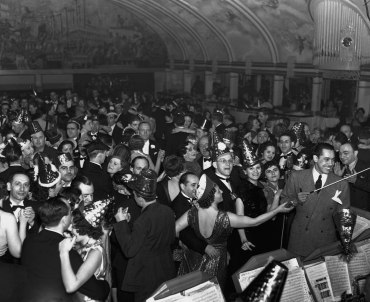Fats Waller: Giant of Jazz
Not only was Fats Waller one of the greatest pianists jazz has ever known, he was also one of its most exuberantly funny entertainers — and as so often happens, one facet tends to obscure the other. His extraordinarily light and flexible touch belied his ample physical girth; he could swing as hard as any pianist alive or dead in his classic James P. Johnson-derived stride manner, with a powerful left hand delivering the octaves and tenths in a tireless, rapid, seamless stream. Waller also pioneered the use of the pipe organ and Hammond organ in jazz — he called the pipe organ the “God box” — adapting his irresistible sense of swing to the pedals and a staccato right hand while making imaginative changes of the registration. As a composer and improviser, his melodic invention rarely flagged, and he contributed fistfuls of joyous yet paradoxically winsome songs like “Honeysuckle Rose,” “Ain’t Misbehavin’,” “Keepin’ Out of Mischief Now,” “Blue Turning Grey Over You” and the extraordinary “Jitterbug Waltz” to the jazz repertoire.
During his lifetime and afterwards, though, Fats Waller was best known to the world for his outsized comic personality and sly vocals, where he would send up trashy tunes that Victor Records made him record with his nifty combo, Fats Waller and his Rhythm. Today, almost all of Fats Waller’s studio recordings can be found on RCA’s on-again-offagain series The Complete Fats Waller, which commenced on LPs in 1975 and was still in progress during the 1990s.
Thomas “Fats” Waller came from a Harlem household where his father was a Baptist lay preacher and his mother played piano and organ. Waller took up the piano at age six, playing in a school orchestra led by Edgar Sampson (of Chick Webb fame). After his mother died when he was 14, Waller moved into the home of pianist Russell Brooks, where he met and studied with James P. Johnson. Later, Waller also received classical lessons from Carl Bohm and the famous pianist Leopold Godowsky. After making his first record at age 18 for Okeh in 1922, “Birmingham Blues” and “Muscle Shoals Blues,” he backed various blues singers and worked as house pianist and organist at rent parties and in movie theaters and clubs. He began to attract attention as a composer during the early and mid-1920s, forming a most fruitful alliance with lyricist Andy Razaf that resulted in three Broadway shows in the late ’20s: Keep Shufflin’, Load of Coal and Hot Chocolates.
Waller started making records for Victor in 1926; his most significant early records for that label were a series of brilliant 1929 solo piano sides of his own compositions like “Handful of Keys” and “Smashing Thirds.” After finally signing an exclusive Victor contract in 1934, he began the long-running, prolific series of records with his Rhythm, which won him great fame and produced several hits, including “Your Feet’s Too Big,” “The Joint Is Jumpin’” and “I’m Gonna Sit Right Down and Write Myself a Letter.” He began to appear in films like Hooray for Love and King of Burlesque in 1935 while continuing regular appearances on radio that dated back to 1923. He toured Europe in 1938, made organ recordings in London for HMV and appeared on one of the first television broadcasts. He returned to London the following spring to record his most extensive composition, London Suite for piano and percussion, and embark on an extensive continental tour (which, alas, was cancelled by fears of impending war with Germany).
Into the 1940s, Waller’s touring schedule of the U.S. escalated, he contributed music to another musical, Early to Bed, the film appearances kept coming (including a memorable stretch of Stormy Weather where he led an all-star band that included Benny Carter, Slam Stewart and Zutty Singleton), the recordings continued to flow, and he continued to eat and drink in extremely heavy quantities.
Years of draining alimony squabbles, plus overindulgence and, no doubt, frustration over not being taken more seriously as an artist, began to wear the pianist down. Finally, after becoming ill during a gig at the Zanzibar Room in Hollywood in December 1943, Waller boarded the Santa Fe Chief train for the long trip back to New York. He never made it, dying of pneumonia aboard the train during a stop at Union Station in Kansas City.
How Horwitz Met "Fats"
As a teenager, Murray Horwitz was already deeply involved in music; specifically, he was a jazz fan, which meant he listened to records of jazz greats and cultivated his "ear." He also wanted to perform comedy. One day in the Dayton, Ohio Public Library he checked out Fats Waller's album Valentine Stomp.
He was smitten, because he realized Waller "is the point where those two art forms meet: he is the greatest jazz pianist who ever tried to make people laugh, and the greatest comedian who ever played jazz." So he bought every piece of Waller's music he could find.
Horwitz was surprised to learn the 1960s' did not share his passion for Waller; in fact, the world had largely forgotten his music and moved on to the Beatles. So Horwitz took action: "I was able to turn my passion into the Broadway musical, Ain't Misbehavin'. But the reason for the success of that show," Horwitz insists, "was overwhelmingly the excellence and universal appeal of Fats Waller."
.jpg)
Horwitz on the Appeal of Fats Waller
Universal—not music for some but music for all. Horwitz believes "[Waller's] target audience was all of us." In his music, Fats Waller "isn't just letting us know what the real deal is; he's reminding us that we already know what it is. And he's letting us know that he knows we know.… The one way that works is if, on some level, we all share some common traits, some values, some needs. Fats confirms that for us. He lets us in on it with his fingers, his smile, his voice, and his eyebrows, which … always let you know there was at least one more joke inside the one he'd just told."
Waller's music also helps us deal with our human flaws: "in his pianism, in his compositions, in his voice, in his very physical presence, he continually contrasts a heavy assertiveness with a light elegance."
Horwitz wanted this show because "nobody has ever played stride piano better than Fats Waller." Recordings keep his music alive for new audiences, but sharing the "freshness, energy, and dazzle" of that music live on stage can demonstrate exactly why Fats Waller is one of the men whose compositions "[changed] the course of American popular piano music."
Fats Waller performing "Ain't Misbehavin'" in Stormy Weather (1943):
courtesy of allmusic.com
Portland Center Stage is committed to identifying & interrupting instances of racism & all forms of oppression, through the principles of inclusion, diversity, equity, & accessibility (IDEA).
















